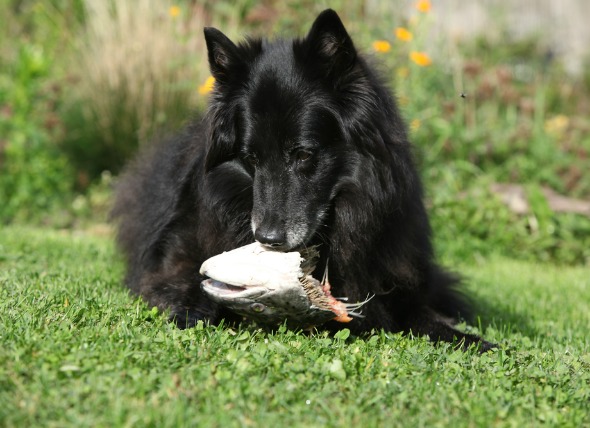
Amino acids are critical to life. With over 20 types of amino acids present in the body, they act as the building blocks for proteins and are essential to the proper functioning of the body. One such amino acid, taurine, is distributed throughout the body with high concentration in certain tissues including heart wall muscles, in the retina of the eye, and brain. The exact function of taurine in these tissues remains elusive even while it is known to be essential.
Essential, or indispensable amino acids are a group of amino acids that cannot be synthesized in the body and are thus required to be taken in through diet. This is a well known nutritional defect that is known to affect the health of cats when they are lacking taurine in their diet, but does not affect dogs in the same way, as dogs are able to synthesize taurine in their bodies. This is why taurine is usually not added to dog foods but is added to cat foods.
However, some dogs may suffer from taurine deficiency in relation to certain diseases and may need to have taurine added to their diets. If dealing with heart disease, the deficiency can leads to enlarged heart size (dilated cardiomyopathy). Certain breeds of dogs appear to be predisposed to taurine deficiency: American cocker spaniels and giant breed dogs like the Newfoundland, amongst others.
There are no symptoms specifically related to taurine deficiency. However, as taurine deficiency causes dilated cardiomyopathy, the symptoms are usually related to this disease.
You will need to give a thorough history of your dog's health, including a background history of symptoms. After taking a detailed history, your veterinarian will conduct a complete physical examination on your dog. During the physical examination, the attending veterinarian will thoroughly examine your dog's heart.
Routine laboratory tests will include a complete blood count (CBC), biochemistry profile, and urinalysis. The results of these tests are usually found to be normal in these patients unless some other disease or condition is also present.
The urinalysis may reveal abnormal changes in the urine due to a concurrent condition called cystinuria, a disorder of the amino acid transporter which has as a main symptom of stones in the bladder, kidneys or ureter, may also be present. This is more commonly seen in certain breeds, such as Newfoundlands, Scottish terriers, Basenjis, bassets, Chihuahuas, and Australian Shepherds. The stones/crystals may not be passed from the urinary tract, but may cause additional health problems such as pain and blood in the urine and will need to be treated on its own.
If cystinuria is a cause of the taurine deficiency in your dog, your veterinarian will send the blood sample to the laboratory for the evaluation of blood taurine levels, which are often found to be low in dogs affected with cystinuria. If heart disease is also present, chest X-rays, electrocardiogram (ECG), and other diagnostic measures can be used to evaluate and diagnose the severity of the disease. Retinal damage in patients with taurine deficiency is also common. Therefore, your veterinarian will also perform a detailed eye examination to see if any retinal damage has occurred.
Taurine supplementation is the treatment of choice for dogs suffering from taurine deficiency. In some dogs, lifetime taurine supplementation may be required to prevent recurrent taurine deficiency. This will depend on the severity of the deficiency and your dog's ability to maintain levels of taurine as it is ingested. For some patients, taurine supplementation may be discontinued after resolution of the symptoms.
Good nursing care is required at home during treatment. Give medications at the prescribed dose and frequency to avoid aggravation of the symptoms. In case of heart disease, your dog will need proper rest in a stress free environment at home. Your veterinarian will schedule a follow-up examination to monitor the treatment response in your dog. While dramatic improvement is seen in most animals, some animals don’t respond well to the taurine supplementation and will need further treatment.
 False Pregnancy in Female Dogs
Pseudo-pregnancy in Female Dogs
False pregnancy,
False Pregnancy in Female Dogs
Pseudo-pregnancy in Female Dogs
False pregnancy,
 Teeth Misalignment in Dogs
Malocclusion of Teeth in Dogs
Normally, a p
Teeth Misalignment in Dogs
Malocclusion of Teeth in Dogs
Normally, a p
 Salmon Poisoning Disease in Dogs
Salmon poisoning disease (SPD) is an often fatal
Salmon Poisoning Disease in Dogs
Salmon poisoning disease (SPD) is an often fatal
 Unequal Pupil Size in Dogs
Anisocoria in Dogs
The pupil is the circular open
Unequal Pupil Size in Dogs
Anisocoria in Dogs
The pupil is the circular open
 Degeneration of the Iris in the Eye in Dogs
Iris Atrophy in Dogs
The degeneration of the iris
Degeneration of the Iris in the Eye in Dogs
Iris Atrophy in Dogs
The degeneration of the iris
Copyright © 2005-2016 Pet Information All Rights Reserved
Contact us: www162date@outlook.com